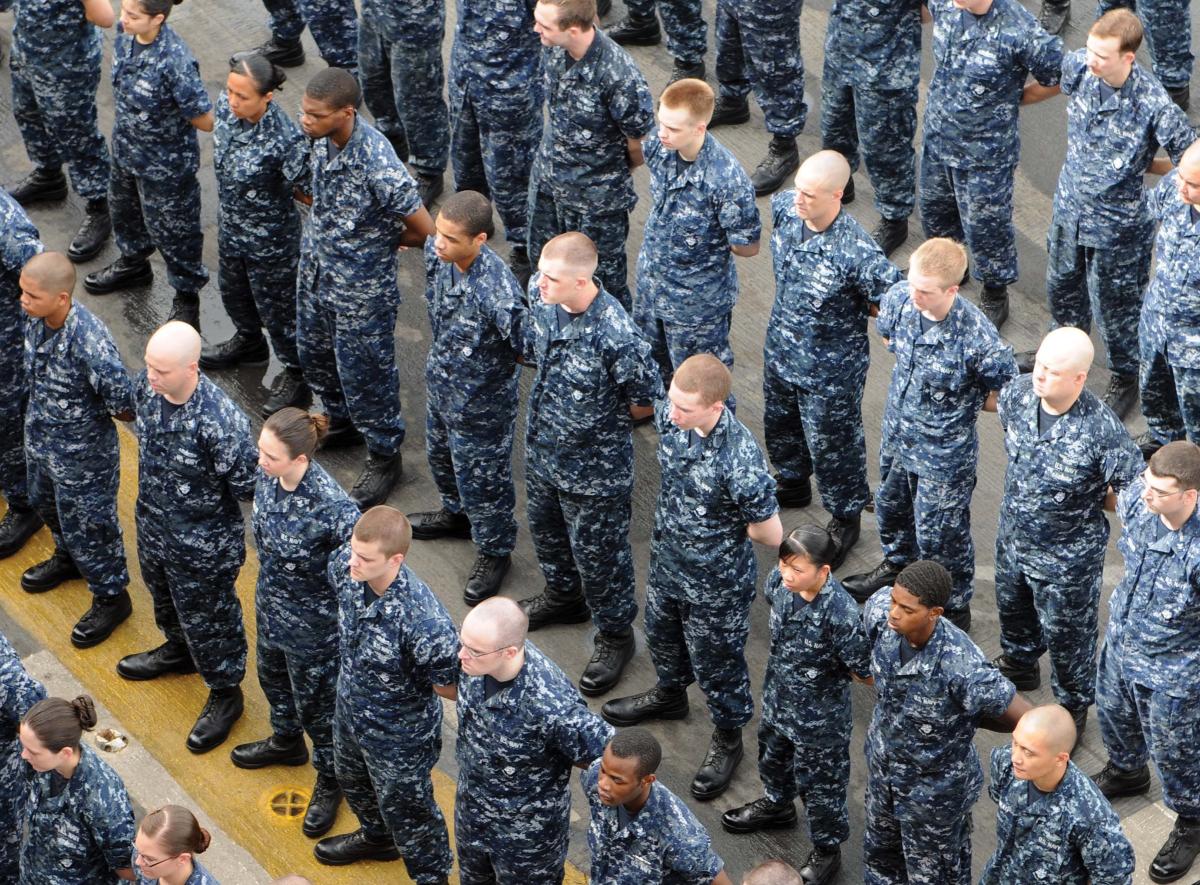The Navy currently falls behind its sister services in professionally developing a noncommissioned officer (NCO) corps, and this creates a major vulnerability as the nation enters a new era of great power competition. The issue is more than a matter of computer-based training or the fledgling Enlisted Leader Development (ELD) courses. At its core, I believe the Navy’s culture has eroded decision-making, authority, and respect away from third-, second-, and first-class petty officers, and even chiefs. As a result of this centralization of control and authority higher in the chain of command, the Navy now has a generation of petty officers who are inconsistently prepared for leading in future near-peer naval combat at sea.
It is troubling that I learned more about how to be a petty officer in the Navy while serving at a joint combatant command on an Air Force base than while under way on board a ship. In fact, until serving in a joint tour, I had no concept of what it meant to be an NCO, or more important, the fact that I was one and what that entailed. Moreover, it would appear the Navy differentiates petty officers from NCOs, as joint NCO training documents and manuals discuss “the noncommissioned officer and petty officer” as if the two are separate entities.1 This is not the case, and calling a petty officer an NCO should not be viewed as a misnomer.
In November 2019, Army Command Sergeant Major John Troxell, the senior enlisted advisor to the Chairman of the Joint Chiefs of Staff, discussed how U.S. military NCOs perform functions and roles entrusted only to officers in a foreign military.2 Further comments on this subject highlighted the Sergeant Major’s belief that the U.S. military must empower its midlevel managers and leaders to be agile and adaptive, and to solve problems using commander’s intent. Most crucially, he said, “Empowerment can come only through training and trust.”
This is where the Navy has fallen behind in the professional development of its enlisted NCO force. Enlisted leadership “training” for years has consisted of command-driven, weeklong petty officer indoctrination—mainly chiefs and first-class petty officers within the command cycling through PowerPoints with scripted and predictable ethical dilemmas to discuss in the classroom. This happens while the NCOs are watching the clock for lunch or worrying about maintenance plans or other divisional responsibilities. While it is too soon to know the effect the new ELD courses will have, I can attest to the success of sending my sailors to the Air Force’s Airman Leadership School (ALS), and that there is tremendous value in in-residence, professionally administered leadership schools to raise the academic bar and institutional knowledge of our NCOs. When the day comes that a petty officer second class is respected by officers and seaman with the same sharpness as is a sergeant in the Marine Corps, our Navy will have warfighter-ready personnel for great power competition.
“Trust” can be defined in multiple ways and warrants much attention. The Navy has faced many crises of trust in the past decade—scandals, double standards in the enforcement of the Uniformed Code of Military Justice, high suicide rates, and incidents at sea—but my concern is with the Navy’s “trust” in itself. The Navy is rife with risk aversity. Officers have centralized more and more decision-making and authority, as this micromanaging brings a sense of reassurance that there will be fewer surprises that could cost their careers. But now, the Navy has entered a time when soon the greatest threat to a commanding officer will not be a Navy Times headline, but a Chinese warship or Russian submarine.
Navy officers need to be more engrossed in mastering their trade, warfighting, tactics, and strategy to prepare for the storm of conflict on the horizon. Anywhere and everywhere responsibly feasible, daily decision-making must be returned to the NCO corps. Ironically, an essential element of Navy doctrine perfectly exemplifies what is needed—the concept of “Command by Negation,” found in the composite warfare commander construct. Officers, lay out your intent, left and right lateral limits, and information requirements, and allow your NCOs to come to you when a situation meets the criteria. This does not mean close your door and be absent—we need to see you on the deckplates, just do not take command when you are there. Doing so usurps the positional authority entrusted to NCOs. Let us lead, be happy to let us lead you, and show your deference to our technical expertise, and most important, your trust in us.
This is not a new problem, as Lieutenant (j.g.) John M. Kennaday wrote in the October 1932 issue of Proceedings on the subject of helping petty officers assist officers:
Then when it comes to the actual execution of the order, ten to one the officer of the deck, or often, even the first lieutenant, anxious and distrustful to the last, will take charge of a simple operation himself, snatching from all the petty officers concerned prestige, experience, and self-confidence. By which act and similar ones, the navy and its officers are robbed of one of their greatest needs—loyal, efficient, reliable petty officers.3
I ask the Navy to pause and self-reflect. Perhaps my experience is anecdotal, but too often I hear something akin to “I was tired of being treated like a child” as a reason high-performing NCOs do not reenlist. I have heard this so often that, were the Navy to have a way to gather information on why sailors who qualify do not reenlist, I am near certain it would make the top five reasons.
There are no children in the Navy—immature sailors, yes, but children, no. There are myriad minutiae that create a sensation of being treated as a child. For instance, requiring liberty groups of four for certain paygrades, or restricting enlisted personnel from having countertop ovens in barracks rooms with a kitchenette with a cooking range. While I understand the importance of safety, eroding the self-sovereignty of our NCOs and junior sailors can hurt their ability to lead. If they are constantly having their hand held and being micromanaged, they do not even “lead” themselves, so how can the Navy expect them to lead others?
To those who believe that being a petty officer should be distinct from being an NCO, I ask you to consider how different the U.S. armed services are today than they were during the Cold War. The concept of jointness is no longer novel—it has become the operating norm for the U.S. military. My time on board my first ship even saw a handful of Air Force personnel on board for the entire deployment!
So, yes, petty officers must be petty officers, but they also must be able to integrate jointly at the equivalent NCO level with the Army, Marine Corps, Air Force, Coast Guard, and Space Force. The concept of the NCO is not service specific, and it never should be. Every officer of every branch should look at my chevrons and know that a petty officer is trained and trusted just as much as any NCO in any other armed service. Investing in this cross-service trust now will pay dividends for the Navy and the United States come the day conventional military deterrence fails and missiles start flying at our sailors.
The U.S. armed forces, more than any other military in the world, value the noncommissioned, volunteer force that makes up the majority of the fighting force. The Navy’s training and trusting of NCOs is considered by our allies to be the standard to imitate, as the service places more value on critical thinking skills and decision-making in our NCOs than any other military. The Navy must catch up to the standard our soldiers, airmen, and Marines are setting, as the future of conflict for the nation is not returning to forward operating bases in Iraq or Afghanistan; it is chasing adversary submarines, conducting freedom of navigation operations, and maintaining freedom of the seas.
The next time the National Defense Medal is authorized, it likely will involve combat with another nation’s navy, and Navy petty officers must be prepared as NCOs to lead, fight, and win.
1. SgtMaj Bryan B. Battaglia, USMC, The Noncommissioned Officer and Petty Officer: Backbone of the Armed Forces (Washington, DC: National Defense University Press, 2013).
2. Jim Garamone, “Noncommissioned Officers Give Big Advantage to U.S. Military,” Department of Defense, 7 November 2019, defense.gov/Explore/News/Article/Article/2011393/noncommissioned-officers-give-big-advantage-to-us-military/.
3. LTJG John M. Kennaday, USN, “Our Petty Officers—Help Them to Help US,” U.S. Naval Institute Proceedings 58, no. 10 (October 1932): 1,432–40, usni.org/magazines/proceedings/1932/october/our-petty-officers-help-them-help-us.






